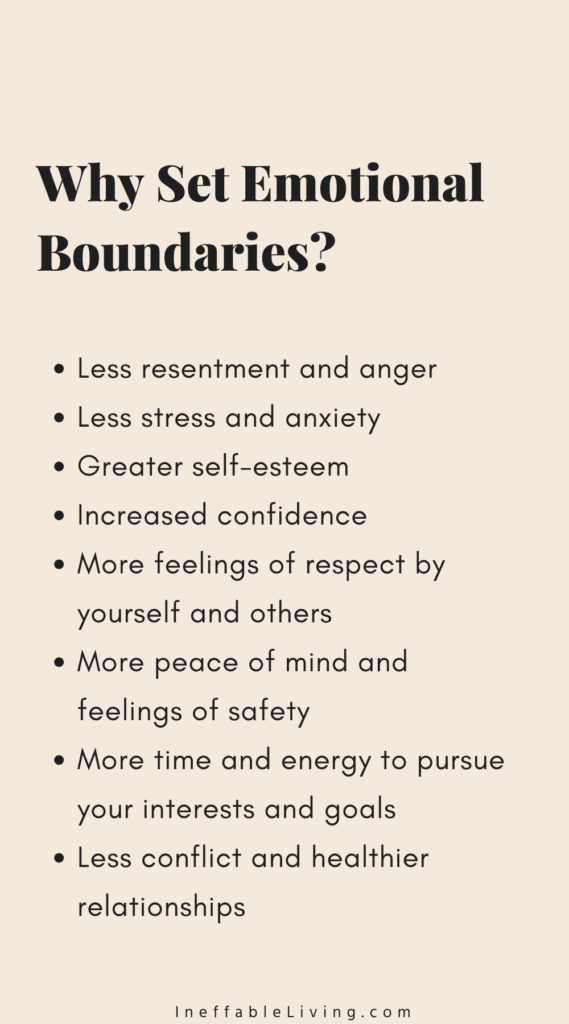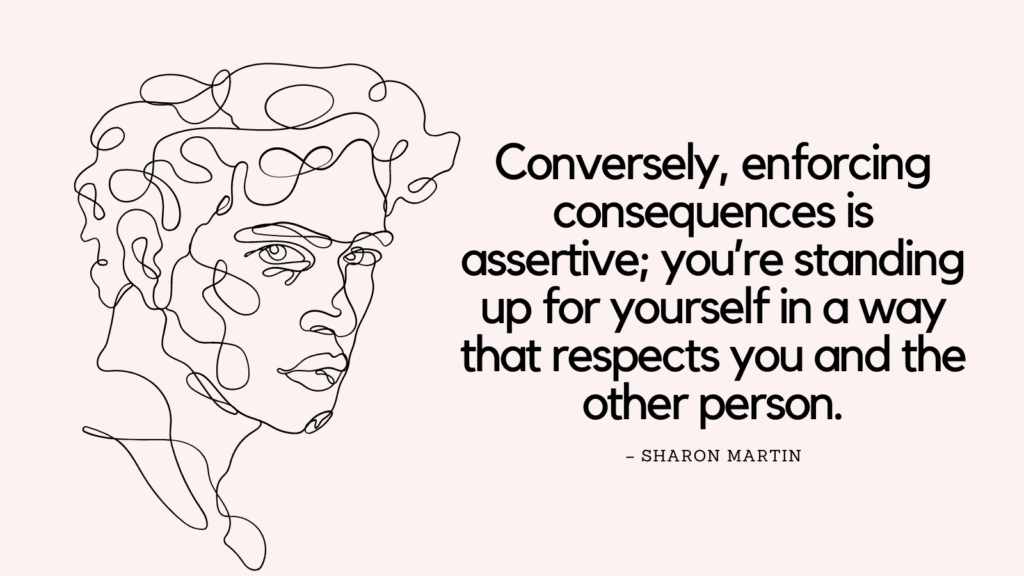This post contains some of the best respect my boundaries quotes.
Respect My Boundaries Quotes
1. “A lack of respect for physical, emotional, and sexual boundaries can lead to abuse by family members or by unsafe people who are allowed into the home. If you grew up in a family with weak boundaries, you probably learned that you can’t trust your parents to keep you safe. You experience the world as unpredictable and scary.” – Sharon Martin
2. “Boundaries are established in two parts: (1) verbally communicating them to others, and (2) taking action, whether implementing consequences or removing yourself from interactions with people who won’t or don’t respect your boundaries.” – Nedra Glover Tawwab
3. “Boundaries are the cure to most relationship problems. But both parties have to participate and respect the boundaries on either side.” – Nedra Glover Tawwab
4. “But boundaries are inherently respectful because they communicate our expectations and help others understand how to interact with us—what’s okay and what’s not okay.” – Sharon Martin
5. “Conversely, enforcing consequences is assertive; you’re standing up for yourself in a way that respects you and the other person.” – Sharon Martin
6. “I hope you find that standing up for yourself is a worthy endeavor, a reflection of your right to respectful and fair treatment, and a step toward being more confident and assertive, even if others are unwilling to listen.” – Sharon Martin
7. “If someone repeatedly disrespects your boundaries, it doesn’t mean that you’re doing it wrong or that you shouldn’t set boundaries with this person. More likely, it means that you need to try a different approach to setting your boundary and increase your self-care to cope with this person.” – Sharon Martin
Related: Top 10 Emotional Boundaries In Dating You Should Set From The First Date
8. “If you communicated your boundary clearly and it wasn’t respected, go back to your brainstorming list and see if you can create a new boundary plan that is within your control.” – Sharon Martin
9. “In healthy relationships, communicating your needs is welcomed and respected. In unhealthy relationships, people ignore you, push back, or even challenge your boundaries.” – Nedra Glover Tawwab
10. “In some cases, your parents might suggest that setting boundaries is disrespectful. But it isn’t disrespectful when done with care. If you’re afraid of disrespecting your parents, you might feel better sharing why the boundary is important to you” – Nedra Glover Tawwab
11. “It’s typical for people to be resistant to changes in a relationship. It can be confusing at first. However, if someone respects you, they will respect these changes. We all grow and evolve, and our relationships must do the same.” – Nedra Glover Tawwab
12. “Once we accept that we can’t make others do what we want—including respecting our boundaries—we can focus on what we can do to meet our needs or how we can communicate them in ways that build cooperative relationships.” – Sharon Martin
Related: What Do Boundaries Sound Like? + 35 Boundaries Examples
13. “Openness (receptiveness to change) and consciousness (willingness to learn and grow) are personality traits of people who are more likely to respect limitations.” – Nedra Glover Tawwab
14. “Parents who respect those boundaries make space for their children to feel safe and loved, and they reinforce the positive habit of articulating needs. When parents ignore these preferences, children feel lonely, neglected, and like their needs don’t matter— and they will likely struggle with boundaries as adults.” – Nedra Glover Tawwab
15. “People ignore boundaries as a passive-aggressive way of pretending they didn’t hear them. But boundaries should be respected. When people ignore our requests, resentment builds. Over time, this erodes respect in the relationship.” – Nedra Glover Tawwab
16. “Personality determines our comfort level with respecting and rejecting boundaries. People with anxious tendencies are more prone to overreact when challenged.” – Nedra Glover Tawwab

17. “Recognizing that you have rights and asking that they be respected doesn’t mean that they will be. Our power primarily lies in being able to meet our own needs when we can’t rely on others to understand and meet them.” – Sharon Martin
18. “Respect your boundaries by honoring the time constraints you’ve set for yourself.” – Nedra Glover Tawwab
19. “Sometimes, boundary violations don’t leave us any good choices; we may ultimately realize that the only way to regain safety, self-respect, and well-being is to end a relationship, leave a job, move, or give up something else that’s important to us.” – Sharon Martin
Related: Top 25 Tips On How To Set Boundaries In A Toxic Relationship? (+FREE Worksheets PDF)
20. “The Law of Respect states that if we wish for others to respect our boundaries, we need to respect theirs. There is no such thing as a free lunch. We can’t expect others to cherish our limits if we don’t cherish theirs.” – Henry Cloud
21. “Unfortunately, there will be times when your boundaries are violated or disrespected. It’s important to consider how to handle boundary violations, understand the importance of enforcing consequences, and explore how boundary violations impact our relationships.” – Sharon Martin
22. “When it comes to boundary-related problems, we usually think about how we’re hurt when we don’t set boundaries or when others don’t respect our boundaries. But it’s important to remember that boundaries are a two-way street. Many of us need to work on respecting other people’s boundaries, not just asserting our own boundaries.” – Sharon Martin
23. “When we allow people to violate our deal breaker boundaries, we pay with our self-respect, safety, health, and self-esteem.” – Sharon Martin
24. “When we don’t respect other people’s boundaries, we can cause them harm. You may not cause physical harm, but you could make someone uncomfortable by intruding on their personal space or privacy. Or you might harm someone by not returning a borrowed item, not following through on a commitment, or “oversharing” too much personal information given how well you know someone.” – Sharon Martin
25. “You will have to put in the work to ensure that your boundaries are respected. It’s your responsibility to follow through on it.” – Nedra Glover Tawwab
Related: Healthy Boundaries Quiz (+Free Pdf Worksheets)

How to Enforce Your Boundaries?
Enforcing your boundaries is an essential aspect of self-care and maintaining healthy relationships.
Here are some steps you can follow to enforce your boundaries effectively:
1. Identify your boundaries: Start by understanding what your personal boundaries are. Reflect on your values, needs, and limits in different areas of your life, such as work, relationships, and personal space.
2. Communicate your boundaries: Clearly express your boundaries to the people around you. Be honest, assertive, and respectful when communicating your limits and expectations. Use “I” statements to express how certain behaviors or situations make you feel.
3. Set consequences: Establish consequences for when someone crosses your boundaries. Consequences can be as simple as expressing your discomfort and asking for a change in behavior or, in more severe cases, distancing yourself from the person involved.
4. Validate your emotions: Understand that it’s normal to have emotions such as guilt, fear, or anxiety when enforcing your boundaries. Validate these feelings but remind yourself that you have the right to prioritize your well-being and set limits.
5. Practice self-care: Taking care of yourself helps reinforce your boundaries. Engaging in activities that recharge and nourish you emotionally, mentally, and physically will provide you with the strength and confidence to maintain and enforce your boundaries.
6. Be consistent: Consistency is key when enforcing boundaries. People may test your limits, especially if they are accustomed to disregarding them. Stay firm, repeat your boundaries consistently, and don’t give in to pressure.
7. Seek support if necessary: If you’re finding it particularly challenging to enforce your boundaries, consider seeking help from a trusted friend, family member, or therapist. Their guidance and support can provide you with perspective and strategies to navigate these situations.
Conclusion
Setting boundaries is not selfish; it’s about respecting your needs and promoting healthy relationships.
By clearly communicating your boundaries and consistently enforcing them, you empower yourself and create healthier dynamics in your life.
References
- Portions of this article were adapted from the book The Better Boundaries Workbook, © 2021 by Sharon Martin. All rights reserved.
- Portions of this article were adapted from the book Set Boundaries, Find Peace, © 2021 by Nedra Glover Tawwab. All rights reserved.



